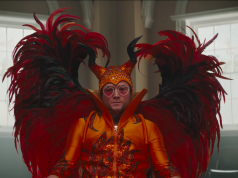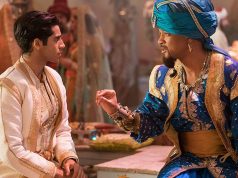The enormous success of the stage musical “Mamma Mia!” (enthusiasm theirs), which uses ABBA songs as its framework, has always puzzled me. ABBA’s songs are catchy, to be sure, and I have several in my iTunes. But they’re not exactly deep, and they certainly don’t tell stories or describe characters. How can you build a musical around them?
Turns out you can’t! Not a good one, anyway. Or maybe you can and these people just didn’t. Whatever. I suspect the live show capitalizes on its exuberance to delight its audiences, but very little of that energy has been translated to the film (directed by Phyllida Lloyd, who also staged the Broadway version). Only in the “Dancing Queen” number, transformed into an ode to Girl Power (defined here as “getting drunk and sleeping around as much as you want”) did I get a sense of the feel-good enthusiasm that must permeate the stage show. The rest of the movie thinks it’s being high-spirited when it’s really just being hyperactive. (What’s the difference? One is annoying, one isn’t.)
Many lighthearted musicals have frilly plots, and I can overlook a few small gaps here and there, but the story cobbled together for “Mamma Mia!” is particularly superficial and imbecilic. It relies on stupid misunderstandings and a complete refusal on everyone’s part to communicate with anyone else. It’s what Roger Ebert calls the Idiot Plot, where all the problems would be solved in the first 10 minutes if all the characters weren’t such morons. A story like this drives me crazy.
Sophie (Amanda Seyfried) is a 20-year-old woman who’s lived her whole life with her mother, Donna (Meryl Streep), on a scenic Greek isle where the two run a rustic hotel. Sophie never knew her father, and in fact Donna isn’t even sure who it is. She was a bit wild in those days, and she slept with three different guys around the time that Sophie was conceived. Now, on the eve of her wedding, Sophie has secretly invited all three fellas to the island, on the assumption that she’ll know which one is her father the minute she lays eyes on him.
That’s pretty stupid, obviously, and it doesn’t work. The men all show up — travel writer Bill (Stellan Skarsgard), business-y guy Sam (Pierce Brosnan), and other business-y guy Harry (Colin Firth) — and Sophie is stymied. What’s more, she doesn’t want Donna seeing that her old flames are here until the actual wedding, 24 hours from now. So the guys have to hide.
Donna finds them anyway, of course, and for some reason believes their stupid lies about why they’re here, i.e., NOT because Sophie invited them. Now Donna thinks she has to hide the guys from Sophie, for surely her daughter would be traumatized to see all of her potential fathers at once. Oh, and none of the guys realize that they might be Sophie’s father, or catch on to why Sophie invited them. When everything does sink in, each man individually comes to believe he must be Sophie’s father, and each separately tells her he’ll walk her down the aisle at the wedding, and Sophie is too inert and dimwitted to say, “Wait, wait, hang on, let’s sort this out.” Instead, she lets each guy think that he’s the one. Hilarity!
When Sophie’s fiance, Sky (Dominic Cooper), learns that she invited her three dads to the wedding, he gets upset. He thinks that was the whole reason she wanted to have this big dumb wedding — he wanted to elope — and he’s angry that she tricked him into it. He storms off. The next time they see each other is at the altar, and the fight they had is never referred to. So why include it at all, especially considering it was such a ridiculous fight to begin with?
As you can see, the screenplay, adapted by Catherine Johnson from her own stage version, is an absolute mess, a symphony of wrong notes and dumb contrivances. Making it worse is the clumsy way the ABBA songs have been crammed into it. Remember, these songs were not originally written for these characters or these situations. One of them says the men’s romances with Donna (supposedly a former hippie) were during “the time of flower power,” but if Sophie is 20, then Donna was sowing her wild oats in the mid ’80s, not the early ’70s. The lyric needs only a minor change to fix it, but no — the song appears exactly as ABBA wrote it, whether it makes any sense or not.
At best, the songs kind of apply to whatever’s going on when they are sung, as when the girls at the bachelorette party sing “Gimme! Gimme! Gimme! (A Man After Midnight)” while they molest all males within arm’s reach. At worst, Donna is giving a heartfelt rendition of “The Winner Takes It All,” and you can tell it’s quite an emotional moment for her, yet you have no idea why it’s so emotional because the lyrics are just generic pop-ballad lyrics and you don’t see how they relate to the situation.
No, I misspoke. The worst is when a character will change the previously established elements of her personality just to sing a song. For example, there’s headstrong Donna, declaring right up front that she doesn’t need a man in her life, then immediately singing “Money, Money, Money,” about how it would be awesome if she met a rich guy who would take care of her. Or at the end, when Donna’s independent, tired-of-men pal Rosie (Julie Walters) suddenly throws herself at Bill. Why? Well, I imagine the conversation in the studio boardroom went like this:
STUDIO EXEC #1: The movie’s almost over, but no one has sung “Take a Chance on Me” yet!
STUDIO EXEC #2: Simple. We’ll have Rosie sing it to Bill.
PERSON WITH COMMON SENSE: But Rosie has been well established as a woman who doesn’t need men to feel good about herself. She has no use for men. Why would she sing a song in which she desperately tells a guy, “If you change your mind, I’m the first in line … If you need me, let me know, I’m gonna be around”?
STUDIO EXEC #1: How did you get in here?
STUDIO EXEC #2: (pushing a button on the phone) Security!
Meryl Streep might occasionally make bad movies like this one, but she never gives anything less than a full performance. Here she is completely committed to her character, even though the character is thinly drawn and buffoonish. She’s got a terrific voice, too (a compliment I cannot extend to Pierce Brosnan). Christine Baranski, playing Donna’s man-hungry, plastic-surgery-enthusiast friend Tanya, is also a welcome sight.
As Sophie, Amanda Seyfried has the advantage of being pretty and having a lovely singing voice. Her character is borderline retarded, but Seyfried almost makes me like her. Frankly, if you really love ABBA, I think you’d be better served staying home and listening to an ABBA CD.
D (1 hr., 48 min.; )





